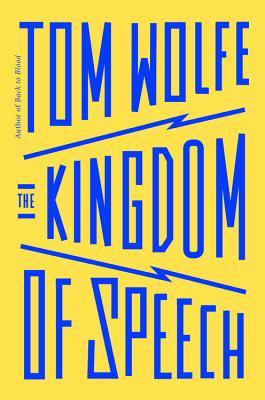“Little lamb, Who made thee?”
—William Blake
This latest is vintage Tom Wolfe. As in Radical Chic and The Painted Word, he casts his uniquely probing eye on fashionable orthodoxy and its establishment priests—in this case the strange religious cult of evolution. While evolution may presume, sometimes dubiously, to describe the world, it can explain nothing. Its theory of First Cause in a primordial ooze or Big Bang is an assumption of faith in the same category as the Navajo cosmogony that life began with a dung beetle—only seemingly more sophisticated than Kipling’s account of how the leopard got his spots and a good deal less humane and poetic than Genesis. It does not tell us what we long most to know: Who? Why?
As the author points out, evolution does not meet any of the established criteria of scientific proof. Nobody has ever observed and recorded it. It cannot be replicated. It fails the “falsifiability test.” No firm predictions can be derived from it. Darwin’s best guess on the First Cause was “four or five cells floating in a pool somewhere.”
In particular evolution cannot account for spoken language, which separates humanity from the rest of creation and is the basis of all civilization. It even separates us from our closest genetic cousins, the chimpanzees. This problem has been mostly ignored by the priests of evolution. Darwin’s attempts at explaining the origin of language were feeble. Then came Noam Chomsky with a theory, also unproved, but sensational, cleverly marketed, and overnight an orthodoxy. According to Chomsky’s theory, which reigned for four decades, speech was a genetic product of evolutionary adaptation, a universal and innate capacity somewhere in the human brain. Wolfe has fun showing how the nonestablishmentarian linguist Daniel L. Everett exploded Chomsky’s theory by real field work among the most primitive people of the Amazon, who demonstrably lacked the presumed innate faculty. The Pirahã people had to make their language the same way they made their other primitive possessions. Language was not evolutionary; it was a “cultural tool” that man made for himself.
In characteristic style Wolfe gives us the personal and scientific imperfections of such revered gurus as Charles Darwin, Thomas Henry Huxley, and Chomsky. As always, the author keeps his sense of humor. Scholars, after all, are human. They have the sins and imperfections of all us human creatures and perhaps some more of their own. They defend their turf as ruthlessly as embattled baboons. They shun critics of the ruling orthodoxy like sorority sisters shun the unfashionably dressed. As Wolfe so truly states, evolution is not a theory; it is a religion for an atheist age.
Chomsky was finally forced to admit, after a campaign of stonewalling and attacks on the opposition by his disciples, that “evolution of the faculty of language largely remains an enigma.” Nobody has ever credibly explained how speech could have evolved from animals, but to our savants it just had to be evolutionary. Wolfe comments:
“An enigma! A century and a half’s worth of certified wise men . . . six generations of them had devoted their careers to explaining exactly what language is. After all that time and cerebration they had arrived at a conclusion: language is . . . an enigma. Chomsky all by himself had spent sixty years on the subject. He had convinced not only academia but an awed public that he had the answer. And now he was a signatory of a declaration that language remains . . . an enigma?”
According to Wolfe, speech should be recognized as its own kingdom—a fourth to animal, vegetable, and mineral. Words characterize man and account for all his works. For those of us who love words, this is a charming thought. He convinces me that speech did not evolve from the animal kingdom, but is it something man made for himself? Wolfe does not follow me this far, I think, but until the unlikely event that somebody finds something better, I’ll go along with “In the beginning was the Word.”
[The Kingdom of Speech, by Tom Wolfe (New York: Little, Brown & Co.) 185 pp., $26.00]

Leave a Reply